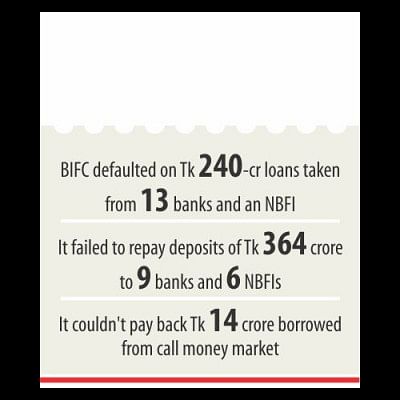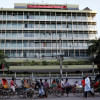BIFC faces liquidation

Bangladesh Industrial Finance Company Ltd (BIFC), a non-bank financial institution or NBFI, faces liquidation as it has failed to pay back loans and deposits of Tk 640 crore to 19 banks and seven NBFIs.
Besides, 96 percent of the BIFC's outstanding loans of Tk 822 crore became defaulted in December last year.
Of the affected institutions, 13 banks and one NBFI already declared the BIFC a defaulter between September and December last year, and several of them requested Bangladesh Bank to help them get back their money.
They say the BIFC has thrown them into a severe liquidity crisis with some of them planning to go to court for recovering the money.
In December 2015, the central bank appointed one of its general managers as an observer in the BIFC board. But the move could not help improve the institution's financial health, and the BB finally withdrew its observer six months ago.
Finding no other option to save the BIFC, the BB in consultation with the finance ministry is mulling liquidation of the NBFI.
“We are waiting for the finance ministry's recommendations on whether to go for liquidation, restructuring or merger of the BIFC. But it won't be easy as we have no experience of liquidating any bank or NBFI,” said a BB high-up, seeking anonymity.
Contacted, Debashish Chakraborty, spokesperson and executive director of the BB, declined to comment on the matter.
In February, the central bank wrote to the finance ministry, seeking suggestions about the fate of the company. The BB proposed three major options -- liquidation, restructuring and merger, said several BB officials.
The ministry replied to the BB in the last week of March, asking it to assess the impacts if the BIFC is liquidated. The ministry also sought explanations from the BB why it did not cancel the BIFC's licence despite its dismal performance.
Md Eunusur Rahman, secretary of the Bank and Financial Institutions Division of the finance ministry, said the ministry is yet to decide on the fate of the BIFC.
“We have sought the central bank's opinion in this regard,” he told this newspaper last month.
According to the Financial Institutions Act 1993, Bangladesh Bank can apply to the High Court for liquidating any NBFI for failure to pay back loans and deposits. The court will then decide on the liquidation of the institution.
The BIFC, however, says if the regulator moves to liquidate the institution, it may affect the entire financial sector.
“Liquidation is not the right move, rather the central bank can take an initiative to bail out the BIFC,” said MM Mostafa Bilal, acting managing director of the BIFC.
In a probe in 2016, the BB found former BIFC Chairman and ex-BNP leader Maj (Retd) Abdul Mannan largely responsible for the institution's financial crisis.
The financial health of the BIFC, established in 1998 by a group of entrepreneurs led by the then state minister Mannan, started to decline in 2008.
The BB found that Mannan, also secretary general of Bikalkpa Dhara Bangladesh, and his family members embezzled Tk 518 crore from the BIFC between 2005 and 2015 in the form of loans against 53 fictitious companies and individuals.
The loans became bad in 2015 and rose to Tk 1,027 crore with interest as of February this year, according to the BIFC data.
As the majority of the borrowers are fictitious, the BIFC is finding it difficult to recover the money, said one of its officials, seeking anonymity.
The central bank removed Mannan's wife Umme Kulsum Mannan, also former BIFC chairman, and their two daughters from the BIFC board between 2015 and 2016 for alleged involvement in sanctioning the loans unlawfully.
Issues such as the BIFC's failure to pay back loans and deposits to banks and NBFIs began to surface last year.
Around Tk 364 crore that nine banks and six NBFIs deposited with the BIFC became mature between September last year and April this year. But the BIFC failed to pay back.
Of the deposits, Tk 71 crore belongs to Bangladesh Commerce Bank Ltd, Tk 50 crore to Rupali Bank, and Tk 51 crore to Bangladesh Infrastructure Finance Fund Ltd.
Mohammad Shams-Ul Islam, managing director of Agrani Bank, said the bank, which deposited Tk 20 crore with the BIFC and lent it Tk 4 crore in call money, plans to file a case against the institution for getting back the money.
Besides, loans of Tk 240 crore that 13 banks and an NBFI gave to the BIFC have become defaulted.
Of the loans, Tk 47 crore was given by Mercantile Bank Ltd, Tk 35 crore by the Dutch-Bangla Bank Ltd and Tk 33 crore by Uttara Bank Ltd.
“We have sent several letters to the BIFC, reminding it to pay us back,” said Mati Ul Hasan, additional managing director of Mercantile Bank.
Failing to recover the money, Mercantile Bank is preparing to sue the BIFC, he said, adding that the bank is now in a crisis as it has to keep a provision of Tk 47 crore against the defaulted loan.
The DBBL that gave the BIFC a total of Tk 70 crore in deposits and loans was forced to keep a provision of the entire amount as it could not recover the money.
The BIFC even failed to pay back loans of Tk 14 crore taken from call money market. Such loans are given for a day to meet the emergency needs of a financial institution.
The BIFC also owes Tk 215 crore to individual depositors.
Former BIFC chairman Mannan, whom the BB holds responsible for the institution's severe crisis, claimed that he is a victim of conspiracy by a Chittagong-based business group and some central bank officials.
“A Chittagong-based conglomerate has been trying to take over my shares in the BIFC illegally, and a vested quarter of the central bank is helping it,” he said.
He also claimed that of the defaulters with the BIFC, only three are his relatives and the rest are unknown to him.
“I volunteered to recover the defaulted loans as the BIFC is my company,” he said adding that he had recovered Tk 120 crore from the defaulters but the new board embezzled that money.

 For all latest news, follow The Daily Star's Google News channel.
For all latest news, follow The Daily Star's Google News channel. 








Comments